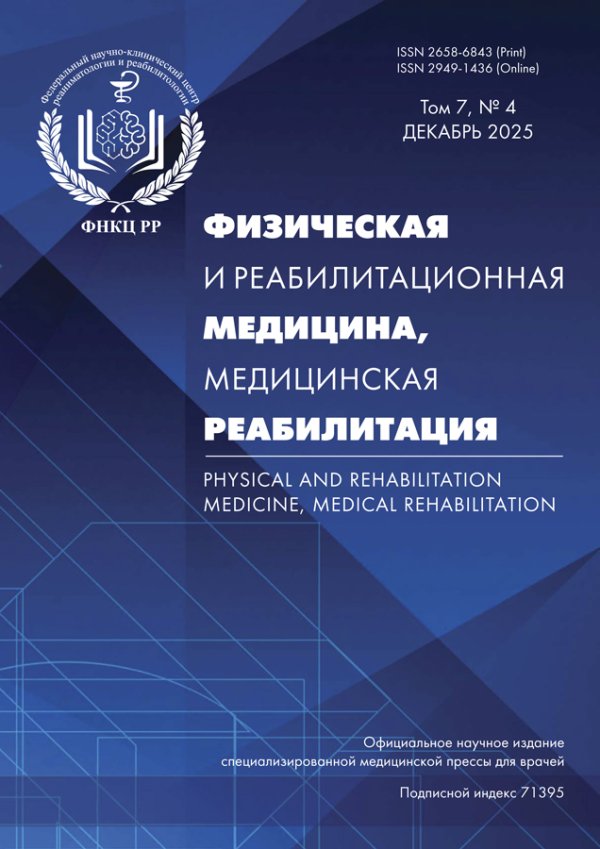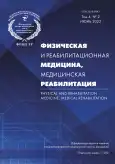Rehabilitation Environment for Patients with Chronic Impairment of Consciousness
- Authors: Nekrasova I.Y.1, Borisov I.V.1, Kanarsky M.M.1, Pradhan P.1,2, Deriushkin V.G.3, Sorokina V.S.1, Petrova M.V.4,2, Stern M.V.5,6, Yarotskaya I.A.7
-
Affiliations:
- Federal Scientific and Clinical Center of Intensive Care Medicine and Rehabilitology
- Peoples Friendship University of Russia
- Moscow State University of Medicine and Dentistry named after A.I. Evdokimov
- Federal Scientific and Clinical Center of Reanimatology and Reabilitology
- Federal Research and Clinical Center of Intensive Care Medicine and Rehabilitology
- Institute of Higher Nervous Activity and Neurophysiology of the Russian Academy of Sciences
- The State Budgetary Healthcare Institution of Moscow "The Municipal Clinical Hospital named after M.P. Konchalovsky of the Moscow City Health Department"
- Issue: Vol 4, No 2 (2022)
- Pages: 90-104
- Section: REVIEWS
- URL: https://journal-vniispk.ru/2658-6843/article/view/106538
- DOI: https://doi.org/10.36425/rehab106538
- ID: 106538
Cite item
Full Text
Abstract
The article discusses aspects of providing care to patients with chronic impairment of consciousness at the post-hospital stage: it describes the difficulties faced by relatives of patients caring for loved ones at home; the prospects for the use of remote technologies for the rehabilitation of patients are indicated on the example of the experience of foreign researchers; the experience of creating a rehabilitation environment similar to home (Casa Iride model) is presented with an indication of its strengths and weaknesses. Thus, the basis of modern remote and mobile rehabilitation services should be system platform IT solutions that, based on the principles of digitalization, ensure coordination of interdepartmental interaction and efficient use of resources in the process of providing post-hospital rehabilitation care to patients with severe consequences of organic brain damage.
Full Text
##article.viewOnOriginalSite##About the authors
Iuliia Yu. Nekrasova
Federal Scientific and Clinical Center of Intensive Care Medicine and Rehabilitology
Email: nekrasova84@yandex.ru
ORCID iD: 0000-0002-4435-8501
SPIN-code: 8947-4230
Cand. Sci. (Technical)
Russian Federation, 777 Lytkino village, Solnechnogorsky district, Moscow region, 141534Ilya V. Borisov
Federal Scientific and Clinical Center of Intensive Care Medicine and Rehabilitology
Email: realzel@gmail.com
ORCID iD: 0000-0002-5707-118X
SPIN-code: 7800-6446
Russian Federation, 777 Lytkino village, Solnechnogorsky district, Moscow region, 141534
Mikhail M. Kanarsky
Federal Scientific and Clinical Center of Intensive Care Medicine and Rehabilitology
Email: kanarmm@yandex.ru
ORCID iD: 0000-0002-7635-1048
SPIN-code: 1776-1160
Russian Federation, 777 Lytkino village, Solnechnogorsky district, Moscow region, 141534
Pranil Pradhan
Federal Scientific and Clinical Center of Intensive Care Medicine and Rehabilitology; Peoples Friendship University of Russia
Email: pranilpr@yandex.ru
ORCID iD: 0000-0002-3505-7504
SPIN-code: 8647-4329
Russian Federation, 777 Lytkino village, Solnechnogorsky district, Moscow region, 141534; Moscow
Vladimir G. Deriushkin
Moscow State University of Medicine and Dentistry named after A.I. Evdokimov
Email: dvg@koziz.ru
ORCID iD: 0000-0001-5218-8648
SPIN-code: 8227-1396
Russian Federation, Moscow
Viktoriya S. Sorokina
Federal Scientific and Clinical Center of Intensive Care Medicine and Rehabilitology
Email: vsorokina@fnkcrr.ru
ORCID iD: 0000-0002-1490-1331
SPIN-code: 3407-1625
Russian Federation, 777 Lytkino village, Solnechnogorsky district, Moscow region, 141534
Marina V. Petrova
Federal Scientific and Clinical Center of Reanimatology and Reabilitology; Peoples Friendship University of Russia
Email: mpetrova@fnkcrr.ru
ORCID iD: 0000-0003-4272-0957
SPIN-code: 9132-4190
MD, Dr. Sci. (Med.), Professor
Russian Federation, 777 Lytkino village, Solnechnogorsky district, Moscow region, 141534; MoscowMarina V. Stern
Federal Research and Clinical Center of Intensive Care Medicine and Rehabilitology; Institute of Higher Nervous Activity and Neurophysiology of the Russian Academy of Sciences
Email: mstern@fnkcrr.ru
ORCID iD: 0000-0002-1345-5237
Cand. Sci. (Med.)
Russian Federation, 777 Lytkino village, Solnechnogorsky district, Moscow region, 141534; MoscowIrina A. Yarotskaya
The State Budgetary Healthcare Institution of Moscow "The Municipal Clinical Hospital named after M.P. Konchalovsky of the Moscow City Health Department"
Author for correspondence.
Email: yrotskayia@zdrav.mos.ru
Cand. Sci. (Med)
Russian Federation, MoscowReferences
- Finch J, Groves D. A labour of love: women, work and caring. London: Routledge and Kegan Paul (Eds.); 1983.192 р.
- Gilhooly KJ, Gilhooly ML, Sullivan MP, et al. A meta- review of stress, coping and interventions in dementia and dementia caregiving. BMC Geriatr. 2016;16(1):106. doi: 10.1186/s12877-016-0280-8
- Swartz K, Collins LG. Caregiver care. Am Fam Physician. 2019;99(11):699–706.
- Apóstolo J, Cooke R, Bobrowicz-Campos E, et al. Effectiveness of interventions to prevent pre-frailty and frailty progression in older adults: a systematic review. JBI Database Syst Rev Implement Rep. 2018;16(1):140–232. doi: 10.11124/JBISRIR-2017-003382
- Raciti L, Corallo F, Manuli A, Calabrò RS. Nursing, caregiving and psychological support in chronic disorders of consciousness: a scoping review: nursing and caregiving in DoC. Acta Bio Medica Atenei Parm. 2021;92(S2):e2021013. doi: 10.23750/abm.v92iS2.11329
- Spoorenberg SL, Uittenbroek RJ, Middel B, et al. Embrace, a model for integrated elderly care: study protocol of a randomized controlled trial on the effectiveness regarding patient outcomes, service use, costs, and quality of care. BMC Geriatr. 2013;13(1):62. doi: 10.1186/1471-2318-13-62
- Freud S. The Uncanny. In: The Standard Edition of the Complete Psychological Works of Sigmund Freud. Vol. XVII. Ed. by J. Strachey. London; 1919. P. 219–219.
- Engström Å, Söderberg S. The experiences of partners of critically ill persons in an intensive care unit. Intensive Crit Care Nurs. 2004;20(5):299–308. doi: 10.1016/j.iccn.2004.05.009
- Öhman M, Söderberg S. The experiences of close relatives living with a person with serious chronic illness. Qual Health Res. 2004;14(3):396–410. doi: 10.1177/1049732303261692
- Losada A, Márquez-González M, Peñacoba C, Romero-Moreno R. Development and validation of the Caregiver Guilt Questionnaire. Int Psychogeriatr. 2010;22(4): 650–660. doi: 10.1017/S1041610210000074
- Camak DJ. Addressing the burden of stroke caregivers: a literature review. J Clin Nurs. 2015;24(17-18):2376–2382. doi: 10.1111/jocn.12884
- Tzidkiahu T, Sazbon L, Solzi P. Characteristic reactions of relatives of post-coma unawareness patients in the process of adjusting to loss. Brain Inj. 1994;8(2):159–165. doi: 10.3109/02699059409150967
- Bakas T, Champion V, Perkins SM, et al. Psychometric testing of the revised 15-item bakas caregiving outcomes scale. Nurs Res. 2006;55(5):346–355. doi: 10.1097/00006199-200609000-00007
- Giovannetti AM, Leonardi M, Pagani M, et al. Burden of caregivers of patients in vegetative state and minimally conscious state. Acta Neurol Scand. 2013;127(1):10–18. doi: 10.1111/j.1600-0404.2012.01666.x
- Cipolletta S, Pasi M, Avesani R. Vita tua, mors mea: the experience of family caregivers of patients in a vegetative state. J Health Psychol. 2016;21(7):1197–1206. doi: 10.1177/1359105314550348
- Chiambretto P, Vanoli D. Family reactions to the vegetative state: a follow-up after 5 years. G Ital Med Lav Ergon. 2006;28(1 Suppl 1):15–21. (In Italian).
- Sattin D, Morganti L, De Torres L, et al. Care pathways models and clinical outcomes in Disorders of consciousness. Brain Behav. 2017;7(8):e00740. doi: 10.1002/brb3.740
- Corallo F, Bonanno L, Lo Buono V, et al. Coping strategies in caregivers of disorders of consciousness patients. Neurol Sci. 2018;39(8):1375–1381. doi: 10.1007/s10072-018-3431-1
- Puggina AC, Paes da Silva MJ, Schnakers C, Laureys S. Nursing care of patients with disorders of consciousness. J Neurosci Nurs. 2012;44(5):260–270. doi: 10.1097/JNN.0b013e3182666407
- Imanigoghary Z, Peyrovi H, Nouhi E, Kazemi M. The role of nurses in coping process of family caregivers of vegetative patients: a qualitative study. Int J Community Based Nurs Midwifery. 2017;5(1):70–81.
- Royal College of Physicians. Prolonged disorders of consciousness following sudden onset brain injury: National clinical guidelines. London: RCP; 2020.
- Sato M, Sugimoto M, Yamaguchi K, Kawaguchi T. Evaluation of nursing interventions using minimally invasive assessments methods for patients in a persistent vegetative state: Nursing for persistent vegetative state. Psychogeriatrics. 2017;17(6):406–413. doi: 10.1111/psyg.12265
- Mélotte E, Maudoux A, Delhalle S, et al. Is oral feeding compatible with an unresponsive wakefulness syndrome? J Neurol. 2018;265(4):954–961. doi: 10.1007/s00415-018-8794-y
- Freeman BD. Tracheostomy update. Crit Care Clin. 2017;33(2):311–322. doi: 10.1016/j.ccc.2016.12.007
- Wright SE, van Dahm K. Long-term care of the tracheostomy patient. Clin Chest Med. 2003;24(3):473–487. doi: 10.1016/S0272-5231(03)00054-6
- Kutsukutsa J, Mashamba-Thompson TP, Saman Y. Tracheostomy decannulation methods and procedures in adults: a systematic scoping review protocol. Syst Rev. 2017;6(1):239. doi: 10.1186/s13643-017-0634-0
- Dhand R, Johnson JC. Care of the chronic tracheostomy. Respir Care. 2006;51(9):984–1001; discussion 1002-1004.
- Fife C, Otto G, Capsuto EG, et al. Incidence of pressure ulcers in a neurologic intensive care unit. Crit Care Med. 2001; 29(2):283–290. doi: 10.1097/00003246-200102000-00011
- Cox J. Pressure injury risk factors in adult critical care patients: a review of the literature. Ostomy Wound Manage. 2017;63(11):30–43.
- De la Morena MJ, Cruzado JA. Caregivers of patients with disorders of consciousness: coping and prolonged grief. Acta Neurol Scand. 2013;127(6):413–418. doi: 10.1111/ane.12061
- Lewis SM. Medical-surgical nursing: assessment and management of clinical problems. Vol. 1. Mosby; 2007.
- Crispi F, Crisci C. Patients in persistent vegetative state and what of their relatives? Nurs Ethics. 2000;7(6): 533–535. doi: 10.1177/096973300000700609
- Li Y, Xu Z. Psychological crisis intervention for the family members of patients in a vegetative state. Clinics. 2012;67(4):341–345. doi: 10.6061/clinics/2012(04)07
- Pagani M, Giovannetti AM, Covelli V, et al. Physical and mental health, anxiety and depressive symptoms in caregivers of patients in vegetative state and minimally conscious state: vegetative state and minimally conscious state caregivers’ health. Clin Psychol Psychother. 2014;21(5):420–426. doi: 10.1002/cpp.1848
- Chiambretto P, Ferrario SR, Zotti AM. Patients in a persistent vegetative state: caregiver attitudes and reactions: Caregivers of patients in a persistent vegetative state. Acta Neurol Scand. 2001;104(6):364–368. doi: 10.1034/j.1600-0404.2001.00107.x
- Moretta P, Estraneo A, De Lucia L, et al. A study of the psychological distress in family caregivers of patients with prolonged disorders of consciousness during in-hospital rehabilitation. Clin Rehabil. 2014;28(7):717–725. doi: 10.1177/0269215514521826
- Ponomarenko GN. The international classification of functioning, disability and health as a tool for the scientifically grounded estimation of the effectiveness of medical rehabilitation. Vopr Kurortol Fizioter Lech Fiz Kult. 2013;90(2):57–62. (In Russ).
- Степанова О.Н., Алексеева Г.Ю., Кайрак Н.А. Организация лечебной и реабилитационной работы в отделении активного лечения и наблюдения на дому // Материалы российской конференции «Современные тенденции организации психиатрической помощи: клинические и социальные аспекты». Москва, 5–7 октября 2004. Москва, 2004. С. 111–113. [Stepanova ON, Alekseeva GY, Kayrak NA. Organization of medical and rehabilitation work in the department of active treatment and home observation. In: Materials of the Russian conference «Modern trends in the organization of psychiatric care: Clinical and social aspects». Moscow, October 5-7, 2004. Moscow; 2004. Р. 111–113. (In Russ).]
- Шипулина Л.Н., Блинкова М.Г. Обслуживание инвалидов и пожилых граждан на дому: проблемы и инновации // Бизнес, менеджмент и право. 2010. № 2. С. 147–151. [Shipulina LN, Blinkova MG. Service of disabled and elderly citizens at home: Problems and innovations. Business, management and law. 2010;(2): 147–151. (In Russ).]
- ГОСТ Р ИСО/ТО 16056-1-2009. Национальный стандарт Российской Федерации. Информатизация здоровья. Функциональная совместимость систем и сетей телездравоохранения. [GOST R ISO/TO 16056-1-2009. National Standard of the Russian Federation. Informatization of health. Functional compatibility of tele-health protection systems and networks. (In Russ).] Режим доступа: https://docs.cntd.ru/document/1200083550. Дата обращения: 15.02.2022.
- Starodubtseva OS, Begichev SV. Analysis of the incidence of stroke with the use of information technology. Basic Res J. 2012;8(2):424–427. (In Russ).
- Mark RG. Telemedicine system: the missing link between homes and hospitals? Mod Nurs Home. 1974;32(2):39–42.
- Zundel KM. Telemedicine: history, applications, and impact on librarianship. Bull Med Libr Assoc. 1996;84(1):71–79.
- Bashshur R, Lovett J. Assessment of telemedicine: results of the initial experience. Aviat Space Environ Med. 1977;48(1):65–70.
- Hill AJ, Theodoros DG, Russell TG, et al. An internet-based telerehabilitation system for the assessment of motor speech disorders: a pilot study. Am J Speech Lang Pathol. 2006;15(1):45–56. doi: 10.1044/1058-0360(2006/006)
- Hill AJ, Theodoros D, Russell T, Ward E. Using telerehabilitation to assess apraxia of speech in adults. Int J Lang Commun Disord. 2009;44(5):731–747. doi: 10.1080/13682820802350537
- Theodoros D, Hill A, Russell T, et al. Assessing acquired language disorders in adults via the internet. Telemed E-Health. 2008;14(6):552–559. doi: 10.1089/tmj.2007.0091
- Hill AJ, Theodoros DG, Russell TG, Ward EC. The redesign and re-evaluation of an internet-based telerehabilitation system for the assessment of dysarthria in adults. Telemed E-Health. 2009;15(9):840–850. doi: 10.1089/tmj.2009.0015
- Schopp LH, Johnstone BR, Merveille OC. Multidimensional telecare strategies for rural residents with brain injury. J Telemed Telecare. 2000;6(1 Suppl):146–149. doi: 10.1258/1357633001934474
- Dromerick AW, Edwards DF, Diringer MN. Sensitivity to changes in disability after stroke: a comparison of four scales useful in clinical trials. J Rehabil Res Dev. 2003;40(1):1. doi: 10.1682/JRRD.2003.01.0001
- Zylberman R, Carolei A, Sacco S, et al. An innovative model of a home-like environment for people in vegetative and minimally conscious states. The Neurohospitalist. 2016;6(1):14–19. doi: 10.1177/1941874415596747
Supplementary files








